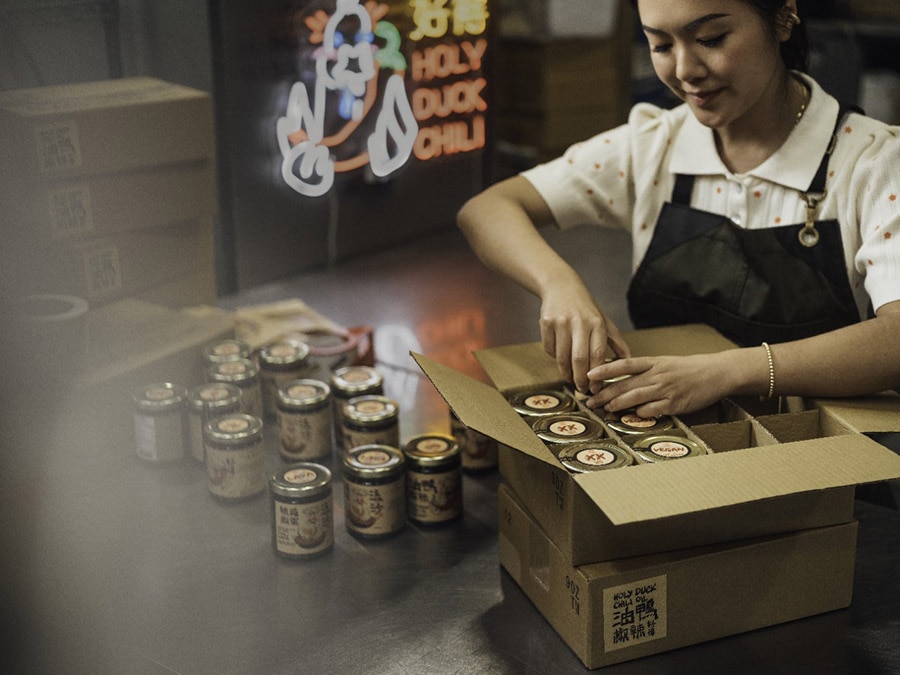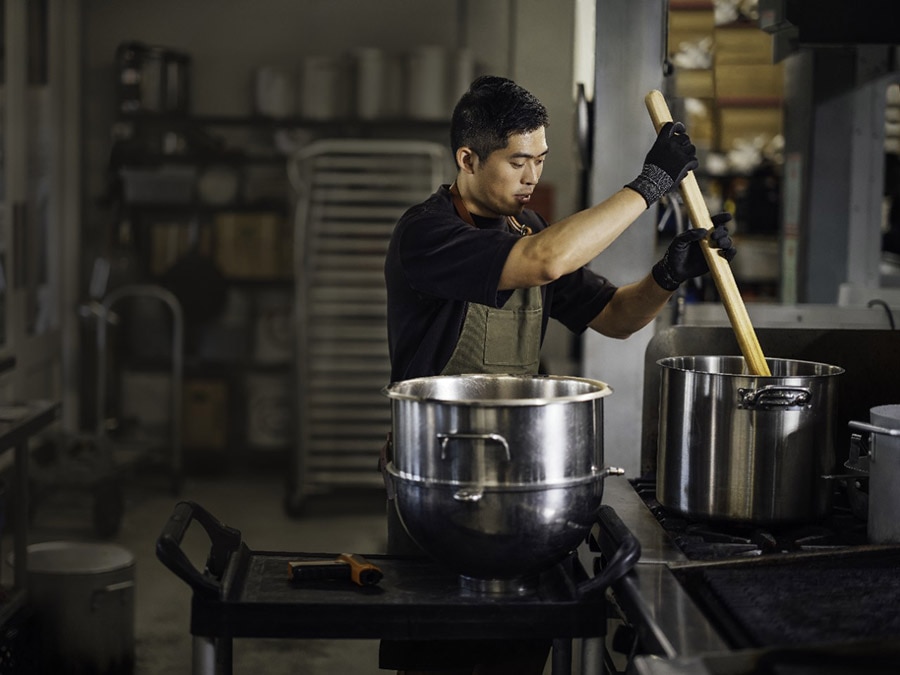Name: Christopher Fung and Louise Pang
Location: Vancouver, CAN
Business: Holy Duck Chili

Name: Christopher Fung and Louise Pang
Location: Vancouver, CAN
Business: Holy Duck Chili

We started Holy Duck because we felt very disconnected after moving from Hong Kong to Canada in 2020. And then COVID hit, which made us feel even lonelier. So we were thinking about what we would do in our culture and in our family to feel more united and connected. To feel more connected to neighbors, relatives, and to new friends. And that’s to cook.
So we decided to make these chili sauces during Chinese New Year of 2021 and started just delivering to the doorsteps of our families and friends just to say hi — like a virtual hug without actually seeing them, but they can actually taste the warmth and love that we deliver to their doors. Everyone loved it and introduced it to their friends, and then we started taking small orders, making small batches in a commercial kitchen. It was a very gradual growth.
I think we have two favorites. Our collection of sauces…they're based on our family recipes. So they’re designed by my grandmother during the Sino-Japanese war when she escaped from mainland China to Hong Kong for safety. So they’re heirloom recipes. Bringing this to Canada, and most importantly as a Canadian immigrant, to be able to use local Canadian ingredients to recreate an heirloom recipe is very, very special to us. Whenever I hold a jar in my hand, I feel like it's a creation of me and my husband — but it also traces back to our family history from three generations ago. And it's also a love letter to Canada.
Our community is the reason we started Holy Duck Chili. Because we felt like the community was too scattered. So for Holy Duck Chili, we tried our very best — after COVID especially — we tried to put up a lot of events around town to get spice-loving people together, and to get people who love Chinese culture together.
We hosted a chili party during Asian Heritage Month at the Chinatown Museum. The community was a mix of Canadian locals, really old generation Chinese immigrants who barely speak English, new immigrants, and tourists. We were all sharing chili-inspired snacks in one spot at the lobby of the Chinatown Storytelling Center.

At first, I would say I felt very, very scared of being a small business owner. As a new immigrant, I knew nothing about the laws of Canada and nothing about how businesses work — how banking, accounting, and everything works. So I was actually hesitant when my husband wanted to start Holy Duck Chili. I was like, “We have no food background and we have no business background! Why the heck would we want to be in business?”
But fast-forward two years later…I would say the fear is gone. Being a small business owner teaches me how to go with the flow and see any bump or any uncertainty as a learning opportunity. And anything negative that we have come across, I’ve got to say, it turned out to be something wonderful.
In comparison to a lot of other condiment or pre-packaged food businesses, I think what's special about us is that we really keep busy. We don’t just focus on the manufacturing or the product itself. Half of our time is spent operating the business, and the other half is creating a lot of people-oriented events, people-oriented merch, or community-oriented things around the brand. So we really keep ourselves very, very busy doing a lot of things outside of the physical product.
We work a lot. There's no sugarcoating it. We really work a lot and we don't take breaks. And last year actually, it was really bad. We worked so much. Our previous kitchen broke down because the ventilator can't take the oily vapor that is released from our small batches of chili oil. So we had to move to a new kitchen, and it took us a four or five month hiatus in operation to be able to do that. We just worked very, very hard, and then we broke down again. We burned out again during the Christmas season.
We have to really take time to sit down and think about how to juggle each hat well. Because we create orders, we communicate with suppliers, we reach out to businesses, we do all of the designs, we do all of the video editing. And sometimes when you do one thing well, you can’t do the others as well.
So we started outsourcing. I might just edit half of the videos and now we have an accounting person to help with our bookkeeping. So as the business is growing, we’re juggling between the hats a lot better. I know very well what my skill set is and what my strengths are. The things that only I can do. The other stuff — I can outsource.
At the very beginning, we just took orders through DM and did a lot through spreadsheets. But we've been using QuickBooks for a year because our business is larger, there are a lot more suppliers, a lot more marketing, and a lot more interaction with different freelancers like photographers, influencers, and videographers. And we might be flying out of the province for trade shows. So expenses are not just the cost of production and the revenue anymore — it's become more complicated. So I'm just learning along the way. I have no business background, so it is pretty crazy thinking about it that it's been two years already. And from just doing everything on spreadsheet, now getting more tools around me, I feel very empowered as a business woman.
Tracking expenses, and more importantly, categorizing them, has been very useful. One of the tools that I use the most is snap-shooting receipts, because we source our materials from 10 or 20 different places around Vancouver. So the invoice is just maybe an email, so it's not like an actual paper receipt. So it can get quite messy. With the QuickBooks app, I don't have to keep a bunch of receipts on hand, I don't lose them, and I can just immediately categorize them.
And last but not least, we use WooCommerce on our website. And it's very easy to link our WooCommerce transactions to QuickBooks, which makes our lives so much easier. There's not much actual physical bookkeeping that I have to do.
Well, it’s our baby. We're not planning to have any kids. So Holy Duck Chili is our first passion project. And with this brand, you actually see your product on the shelf. It's not like anything digital. It's not like an idea. It is an actual product being enjoyed by so many Canadians and Americans. And to be able to feel the product, see them on shelves, I think it's really cool. And to have the flexibility to communicate with different collaborators and bring events and ideas to life, as well.

How to scale my business. Because when I first started Holy Duck Chili, we were just thinking about making 20 or 30 jars of chili oil for friends and family. But then all of a sudden, orders came in and then we were handling — what, 60, a hundred jars — and we were freaking out because we only had four stove tops at home. So immediately we had to source a commercial kitchen. And learning how to package the products properly. So the technical stuff — we really had to pick it up quickly.
I guess initially for a lot of small businesses to be able to succeed, that might mean to be able to break even or sell a certain amount of units of your products. But now that my business has grown a little bit bigger — not like crazy, we’re not in a factory assembly line yet or anything — I think success will mean that I can take my hands off my business more and take my mind off my business more. The business operation can be more automated, and we will be able to have trust in talents and people to help with daily operational bits so that we can really flex our creativity. So that will be my definition of success.
We're trying to incorporate more automation and machines that can imitate human motion. For example, a wok frying motion or being able to track the frying temperature. Because the garlic has to be fried at three different temperatures for three different durations of time. So that's a very difficult machine design process. So it will be a long haul for us in that part of things.